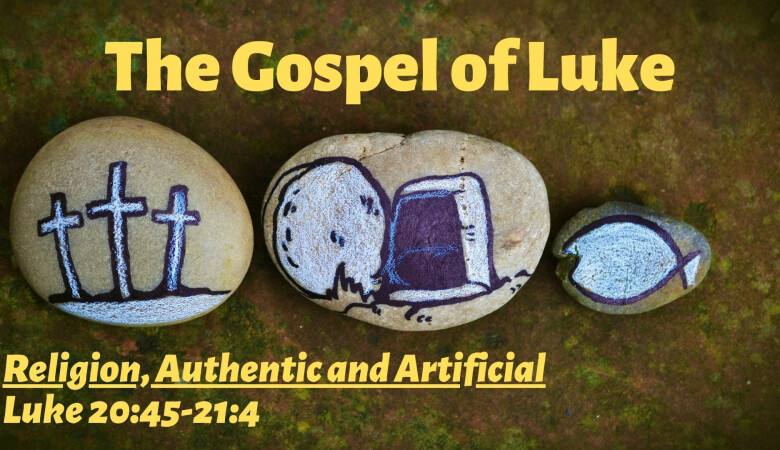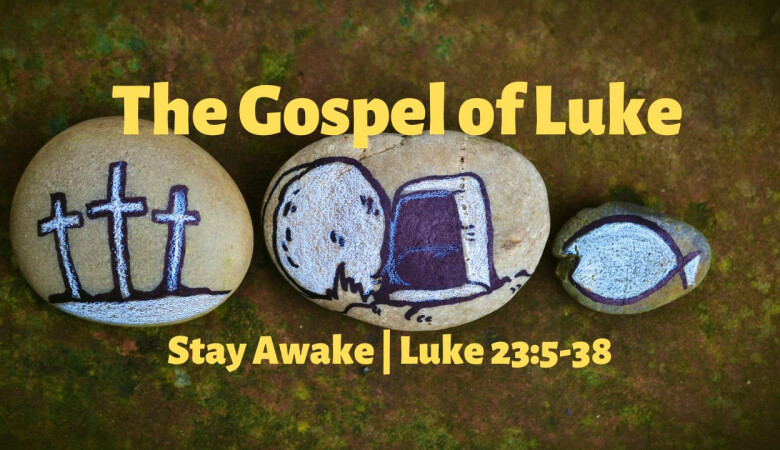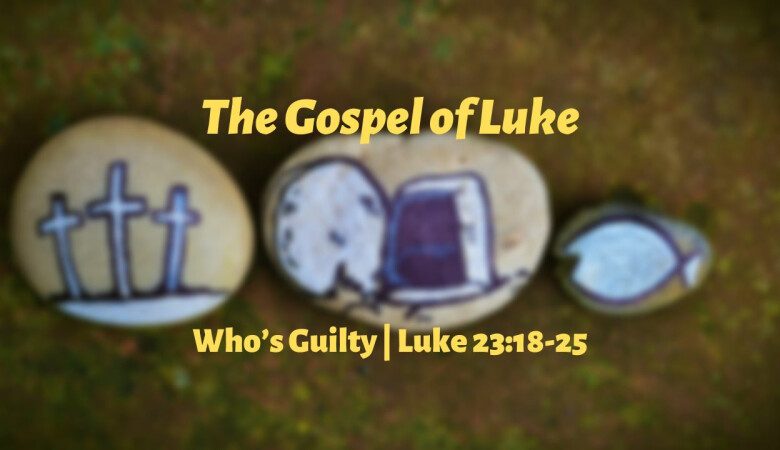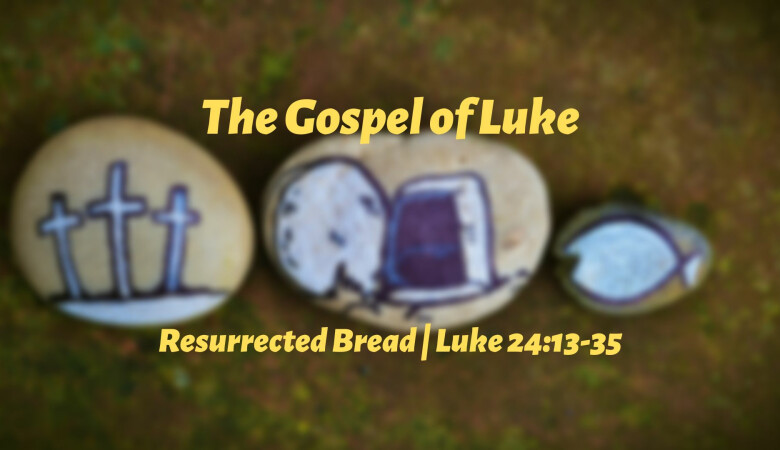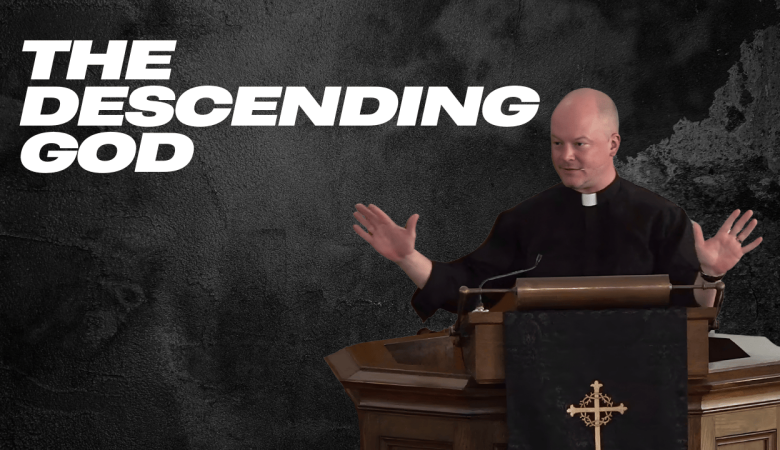Series: Luke
Judas and the Betrayal of God
February 11, 2024 | Peter Rowan
Passage: Luke 22:47-53
ALL SERMONS IN SERIES
Summary
Christians have always been made up of all kinds of different folk. The disciples demonstrate that for us very clearly. They come from different backgrounds and have different personalities and seem to have significantly different faith stories. It's no wonder then that just like the church, there were those in the midst of the disciples who had spent years with followers of Jesus, had sat at his feet and dined at his table, had gone out and shared the gospel and seen God work through them, and then betrayed the Lord. Judas is not far from us. And though there are many lessons to learn from Luke's narrative of the betrayal and arrest of Jesus, likely the greatest lesson for us is: take heed, lest we do likewise.
Transcript
Let me share with you a couple statistics that I read this week:
The growth of atheism globally last year was at .18%. The growth of religious faith was at 1.27%, which is about 7x the growth of atheism. Maybe some of you read about the activist and writer Ayaan Hirsi Ali’s conversion story. She was raised a Muslin who famously converted to Atheism. Who now recently has converted to Christianity. Or you can think of Francis Collins who was the director of the Human Genome Project and the National Institute of Health.
Here’s another one:
The places where Christianity is growing the fastest? Africa (2.77% growth) and Asia (1.50%). In 2000, 814 million Christians lived in Europe and North America, while 660 million Christians called African and Asia home. This year, 838 million live in the global North, while almost 1.1 billion Christians live in Africa and Asia alone.
Here’s another:
In 1900, twice as many Christians lived in Europe than in the rest of the world combined. Today, more Christians live in Africa than any other continent. By 2050, Africa will be home to almost 1.3 billion Christians, while Latin America (686 million) and Asia (560 million) will both have more than Europe (497 million) and North America (276 million).
As Christianity continues to grow in the global South, it is also becoming increasingly less concentrated. In 1900, 95% of all Christians lived in a majority Christian country. In 2022, that number has fallen to 53.7%. By 2050, most Christians (50.4%) around the world will live in non-majority Christian nations.
David Cassidy, a PCA pastor friend who pastors down in Florida wrote this a little while ago:
The average Christian in the world is not male but female, not white but brown or black, third world, not first world, far more Pentecostal than Presbyterian. The “average” Christian in the world today is a 22-year old brown female. She has not been to your conference…
…she has not read CS Lewis or Christianity Today; she has not read your blog, nor mine, and does not go to Starbucks or care one bit about alternative endings to Game of Thrones or if the latest lyric from Hillsongs [sic] agrees with our confessional standards.She is also likely the vessel God will use to prophesy to the next generation. She’s not afraid of suffering either: Over 215 million believers are persecuted with intimidation, prison, and even death for their faith in Jesus Christ across the world (Open Doors, USA)
42% of the world’s population is under 25, half in sub-Saharan Africa and South Asia The median age of the global population is 28. If your ‘mission’ is preservation or expansion of White Christian USA nationalism, you need to wake up & repentSouth American and Central American churches are thriving and reviving. Thank God. We have to be about global mission and embrace all people everywhere with the love of God. That starts with neighbors next door but won’t stop there. White American Nationalist Christians need to be at the feet of these global Christian communities and LEARN again the power of prayer, the presence of God’s power in the absence of political power, and the joy of the Gospel. Man, I have so much to learn!
Now, why do I share this? Well, for many reasons. We need to learn humility as people of the West, or as Americans, or as Reformed Christians. We also need to be encouraged. We also need to appreciate the great breadth of followers of Christ, of Christian disciples.
Think about the disciples. You had people like James the son of Alpheus. He is only mentioned once in each gospel. He was likely a quiet sort. Kept to himself a bit, but a part of the 12. Maybe an enneagram 5, taking all of the information in and processing it quietly. He may have been the brother of Jesus or very likely Matthew the tax collector’s brother who was also the son of Alpheus. Oh, yeah, we have people like Matthew. In cahoots with the Romans. What?! And wildly, if we mention Matthew we should definitely mention Simon the Zealot who would have almost undoubtedly been inclined to hate Matthew and his type. Simon, being a Zealot was a fanatical Jewish patriot, probably all about defending his rights to open cary a sword. He probably had a tattoo that read, “God, swords and country.” He possibly would have been at the capital on January 6 had he lived today. We had Philip who was an evangelist. Right after he started following Jesus he told his buddy Nathanial to do the same. We have Thomas who is known for his doubts, but also his faith. We have the brothers James and John who are called “Sons of Thunder”, maybe for their fiery temperaments. Probably a little abrasive, but John is also known as the disciple whom Jesus loved. There is also Thaddeus who is mentioned with Simon the Zealot, maybe they were buddies.
But today’s story mentions two really famous disciples. Peter and Judas Iscariot. I want us to look at these two disciples and their stories for a moment because interestingly enough we see that both of these men betray Jesus, but with very different ends.
Peter
Peter, of course, is so well known people he leads the church in it’s infancy in the book of Acts, but also because of all of the stories about him in the Gospels. He is brash, a go-getter, rather impulsive and thinks pretty high of his abilities. He makes great statements of faith, but also lives at times in doubt.
Think about this. Peter is the one who makes the great confession of Faith in John 6, “Lord, to whom shall we go? You have the words of eternal life, 69 and we have believed, and have come to know, that you are the Holy One of God.”
Earlier in this chapter of Luke 22 Peter said this to Jesus, “Lord, I am ready to go with you both to prison and to death.”
But then think with me about a couple other Peter statements.
In Matthew 16 we read this: 21 From that time Jesus began to show his disciples that he must go to Jerusalem and suffer many things from the elders and chief priests and scribes, and be killed, and on the third day be raised. 22 And Peter took him aside and began to rebuke him, saying, “Far be it from you, Lord! This shall never happen to you.” 23 But he turned and said to Peter, “Get behind me, Satan!
Or, how about this story in Luke chapter 9: 28 Now about eight days after these sayings he took with him Peter and John and James and went up on the mountain to pray. 29 And as he was praying, the appearance of his face was altered, and his clothing became dazzling white. 30 And behold, two men were talking with him, Moses and Elijah, 31 who appeared in glory and spoke of his departure, which he was about to accomplish at Jerusalem. 32 Now Peter and those who were with him were heavy with sleep, but when they became fully awake they saw his glory and the two men who stood with him. 33 And as the men were parting from him, Peter said to Jesus, “Master, it is good that we are here. Let us make three tents, one for you and one for Moses and one for Elijah”—not knowing what he said.
I mean, these are human disciples. Some are quiet, some have devoted their lives to acquisition of money even against their people, some have wild political ideas, some are fiery, some are brash. They are humans. They are disciples, just like you and me.
And here in this passage they want to defend their Lord: 49 And when those who were around him saw what would follow, they said, “Lord, shall we strike with the sword?” 50 And one of them struck the servant of the high priest and cut off his right ear.
And John tells us in his gospel that that was Peter. We were talking in our staff meeting this week about this passage and were wondering how he only got an ear. Well, the servant likely ducked and dodged the blow. He’s just hacking away. Peter doesn’t know what he is doing, but he is displaying both bravery and loyalty. In his well-intended bravery there is brashness and in the courage there is violence, and in this loyalty there is a kind of denial, a denial of the way of Jesus. Blessed are the peacemakers. And Jesus puts an end to this violence. “No more of this!”
Judas
Now, if we turn to Judas we see the great betrayal of God. Judas had been with Jesus for the past three years. He had seen the great teaching of Jesus. He had gathered up the bread and fish that fed the five thousand. He had been sent out and along with the other disciples and seen God do great things through their teaching. He had witnessed Jesus restore sight to the blind, heal the lame, raise Lazarus. He was one of the twelve, one of the inner circle. So when you think of Judas I don’t want you to just imagine how he is depicted in so much art. Kind of gaunt, gristly, scheming eyes. He was one of them. And so he comes to Jesus and at least motions to him with the greatest sign of affection, a kiss. But that sign of affection was the greatest sign of hypocrisy.
What we learn about Judas from the gospel of John was that the was the treasurer of the disciples, that he was in charge of their moneybag, but that he also helped himself to it and he was a thief. We also know that he betrayed Jesus for just 30 pieces of silver. Now, we don’t really know how much that is worth, but it definitely wasn’t a lot. Some people say that it depends on what counts they were using. It could be as little as $100 or so or as much as a few thousand. Everyone agrees though that it was fulfilling the prophesy of Zachariah where a man of God was sold for essentially the cost of a slave. Either way, it is an insultingly low amount of money.
So, what do we make of this. At the very least, what we can make of it is that Judas betrays Jesus when following Jesus wasn’t worth it for him anymore. He denies Jesus when he wasn’t getting what he wanted out of the deal. He took while he could take and then he discarded him while he could still take a little more.
Which, of course, demands that we ask ourselves the question, what are we about? Are we only into following Jesus for the good feelings it gives us? For the relational connections following Jesus gives us?
When it came down to it for Judas, money and we he could get was his God and any God other than Jesus will take your life. So, Judas, filled with remorse, not repentance, but remorse, gave the money back and hanged himself.
What we have been doing in this sermon is considering the disciples of Jesus. Specifically, we’ve considered mostly Peter and Judas in their acts of betrayal, but I wanted you to think of the disciples largely and the disciples of Jesus today, because I want you to look not so much to the disciples but to Jesus.
You know, it’s easy for us to stereotype a Christian, what they look like, how they speak, how they vote. It’s easy for us to stereotype a betrayer. It’s easy for us to decide where God is at work and what kind of people he works through. But the truth is that God is at work in all kinds of different people in all kinds of surprising ways. Jesus is in control here in this passage. Did you notice that. All along. At each step. Judas comes with the crowd with their swords and clubs and he’s the one who speaks “Judas, would you betray the Son of Man with a kiss?” His dimples brandish their swords and he is the one who stops them and heals. He speaks to the chief priest and the officers and calls them out on their cowardice, but tells them that now is their time because he has already talked with his father and he knows that now is his time!
Because Jesus is the one who is ultimately giving of his life and because he does this he brings life even to the most unexpected places and unexpected people.
Jesus tells us in John 10:17-18 17 For this reason the Father loves me, because I lay down my life that I may take it up again. 18 No one takes it from me, but I lay it down of my own accord.
He is in charge and he gives of himself freely for all kinds of people.
Think with me on this for just a moment. The final miracle that Jesus performed was to heal a man that was hurt by Jesus’ own sword-wielding disciples who were trying to defend Jesus! And, friends, some of you really need to hear this, Jesus is still healing people that have been wounded by his disciples who really think that Jesus needs defending and that other people need to be attacked. Jesus still heals people with those wounds. If you are one of those people that has been badly wounded by Jesus’s disciples, he can heal you too. He healed Malchus. Did you know that that is the name of the servant who’s ear was cut off? Malchus. That’s what John tells us. John tells us that his name was Malchus. John also tells us three times that Judas was Simon’s son! Three times. Listen: (6:71): He spoke of Judas the son of Simon Iscariot. (13:2) During supper, when the devil had already put it into the heart of Judas Iscariot, Simon’s son, to betray him; (13:26-29) So when he had dipped the morsel, he gave it to Judas, the son of Simon Iscariot.
Why are we given these details? Why are we given the name of the servant who’s hear was cut off by an overly-zealous Peter? Why are we given the name three times of the father of Judas who betrayed Jesus? Well, the best argument is that they are mentioned because they would have actually been known in the early church. You know, Mallkus, ask him about it! It was his ear! You know, Simon the Iscariot’s son. It was his son who betrayed Jesus for the price of a slave!! Ask him about it!! We aren’t just given these names to tell us that these stories aren’t just made up, but we are given them that we might know the wild redemption that comes through Jesus to the most unlikely place and the most unlikely people. The young servant who was hurt by the deluded disciples of Jesus almost certainly became a disciple of Jesus. The father of the man who Dante put in the lowest part of hell because of his betrayal was almost certainly a disciples of Jesus!
And what does that mean for you? You too, zealot though you are, son of thunder though you may be, you too can know the redemption and love of Christ. Amen.
Series Information
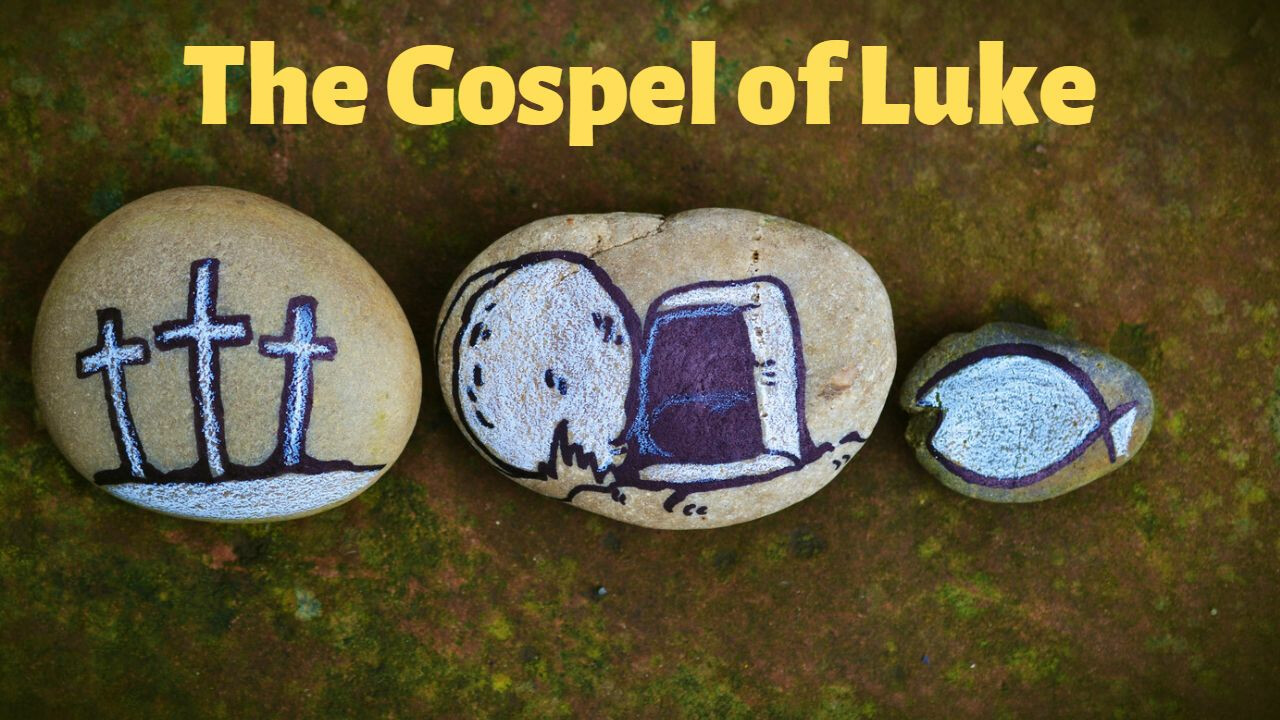
The Gospel of Luke is best described by its author in the first four verses of the book: "Many have undertaken to draw up an account of the things that have been fulfilled among us, just as they were handed down to us by those who from the first were eyewitnesses and servants of the word. With this in mind, since I myself have carefully investigated everything from the beginning, I too decided to write an orderly account for you, most excellent Theophilus, so that you may know the certainty of the things you have been taught."


